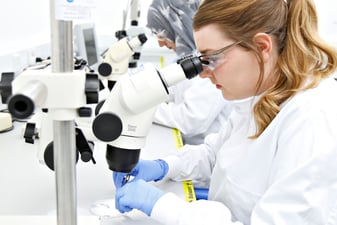Introduction
Inflammatory Bowel Disease (IBD) affects millions of individuals worldwide, presenting a significant challenge for healthcare due to its complex nature and the limited efficacy of current treatments. Recent groundbreaking research from the Francis Crick Institute and University College London has shed light on a genetic factor that plays a crucial role in IBD, potentially paving the way for new therapeutic strategies. At REPROCELL, we are excited to see how these findings align with our innovative approaches to drug discovery, particularly through our popular human fresh tissue assays for IBD.
Genetic Discovery and ETS2's Role
The research team focused on an intergenic haplotype on chromosome 21q22, previously linked to several autoimmune and inflammatory diseases, including IBD, ankylosing spondylitis, primary sclerosing cholangitis, and Takayasu’s arteritis. Through comprehensive functional genomics, they identified the ETS2 gene as a central regulator of inflammatory macrophages, which are key players in the body's immune response and inflammation.
ETS2 was found to be highly expressed in diseased tissues, indicating its significant role in the inflammatory processes associated with these diseases. Overexpression of ETS2 in resting macrophages induced an inflammatory state mirroring that observed in diseases linked to the chr21q22 haplotype, highlighting its impact on the regulation of inflammatory pathways, including TNF and IL-23.
Repurposing Existing Drugs for IBD
One of the most promising aspects of this research is the identification of existing drugs that could potentially modulate the inflammatory pathways driven by ETS2. By leveraging a database of cellular signatures, the researchers pinpointed a class of small molecules with potent anti-inflammatory properties.
These small molecules, originally approved for other conditions such as cancer, were tested in vitro (in the lab) and ex vivo (on tissue samples from patients). The results were highly encouraging, demonstrating significant anti-inflammatory effects which validates targeting ETS2 directly as a potential new avenue for treating IBD. In a similar vein, at REPROCELL, our ex vivo human fresh tissue assays have been instrumental in validating the effectiveness of many clients’ novel drug treatments prior to their use in the clinic.
Implications for Drug Discovery and Development
The implications of this research could be profound for the field of drug discovery. Functional genomics, applied directly in primary human cells and tissues, has proven to be a powerful tool in identifying immune-mediated disease mechanisms and uncovering novel therapeutic opportunities. This approach not only enhances our understanding of the genetic underpinnings of diseases like IBD but also accelerates the development of targeted treatments.
The research team aims to initiate clinical trials within the next five years, a timeline that holds promise for those affected by IBD. The potential to repurpose existing drugs means that these therapies could reach patients faster, offering hope for improved management and eventual cure of IBD.
For more details, read the full research findings here: Major cause of inflammatory bowel disease found - BBC News
Please also see our recent publication on the use of human fresh tissue, genomics, and machine learning in IBD and an overview of our services in fresh IBD tissues.









